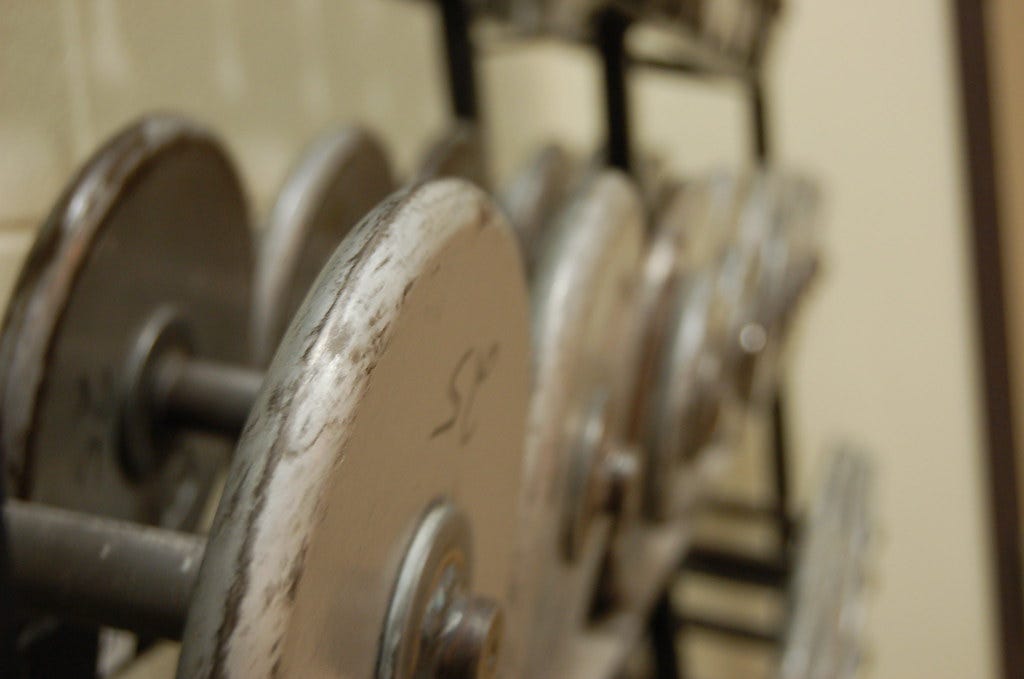Lifting Weights
This week I was reading Bodies of Work, a collection of essays by Kathy Acker themed on, as you might imagine, the body in art. Among the essays on Caravaggio and the films of Peter Greenaway, is an essay on her experiences as a bodybuilder.
Last week I got talking to a bodybuilder in the jacuzzi at my gym. I can’t remember how we got talking, but as soon as she told me she was a bodybuilder (which I guess was pretty obvious) I had a litany of questions I wanted to ask her, but restrained myself, because it seems rude to ask a stranger questions about their body, even if their body is their literal job. But she did volunteer a bit about her life. She’d recently quit her day job. She was in the “cutting” phase of her training: eating less than 700 calories a day to lose all her remaining body fat, on track to become pure sinew and muscle. She could only eat chicken, green vegetables, blueberries and apples, which she would have to weigh out. “You’ll have to pay me if you want to know my macros!” she said, and I nodded and giggled, having absolutely no idea what she meant. I was very impressed with her discipline, though it did seem insane.
Kathy Acker talks about trying to write about her experiences of bodybuilding and weightlifting, and the impossibility of doing so, stating it is something which “rejects language”. She talks about the assumption that athletes are stupid, inarticulate, and how this is reinforced by the minimal and senseless vocabulary of weightlifting (“squats” “reps” “sets”). It made me think of a bit in Miranda July’s All Fours, in which she talks about not recognising the sounds that she makes as she moves through her deadlifts: guttural, animal sounds.
I’ve been weightlifting for just over two years now. I started after developing meralgia paresthetica in pregnancy: a condition where the nerve running through your pelvis is trapped beneath the weight of your growing belly. When I was around five months pregnant the surface of my thigh began burning and tingling, maddeningly, like I was being repeatedly run over by a bunch of tattoo guns (A body! Who’d have one! Gestating a baby! Even worse!). I went to a chiropractor who improbably magicked it away with the heel of her palm, but who made me promise to take up weightlifting after I’d given birth, to “stabilise” my pelvis so it didn’t return.
I’ve always been weirdly strong. Boyfriends have dutifully passed me jars to open, and I’ve always opened them with pride. On tour with an old band, our van broke down, and alone I was able to push it across a service station carpark. I was the only person able to pry open a huge vat of salted butter beans at a beach bar in Lisbon, that was being passed along the bar, customer to customer, eliciting a round of applause (but no free butter beans).
Recently, when I was being obnoxious at a party, I was offering to carry my friends “like a baby or bride”. I was initially very happy looking at the photographs: my friends seemingly floating in my arms, like I was exerting no effort at all. But the more I looked at them, the more ashamed I felt. Why do I pride myself on being so physically strong?! What am I trying to prove? I often feel this same shame at the gym, and recognise something in what Kathy Acker and Miranda July are saying: there is a baseness, an animalism, in lifting weights, and one that feels particularly unbecoming as a woman (when I first started weightlifting my mother, ever the chief functionary of my looks, begged me not to in case I got “too big”).
Acker later goes on to argue the body is its own language, and that in moving through the process of breaking muscle down and building it back up (Brat!) there is a method for “understanding and controlling the physical which is also the self”, a moment in which “meaning and breath become one”. I like moving towards this thinking, as there can be a kind of grace in weightlifting: the methodical attunement to form, the slow articulation of pain, the musicality of the rhythm and repetition.
Acker talks about the use of the word “failure” - you’re supposed to repeat lifts “until failure”. And it has made me wonder about where I am going, when I move the pin up a notch, when I adjust the weight I am lifting, when I add another disc to the barbell: the synonymy of strong enough and failure.


